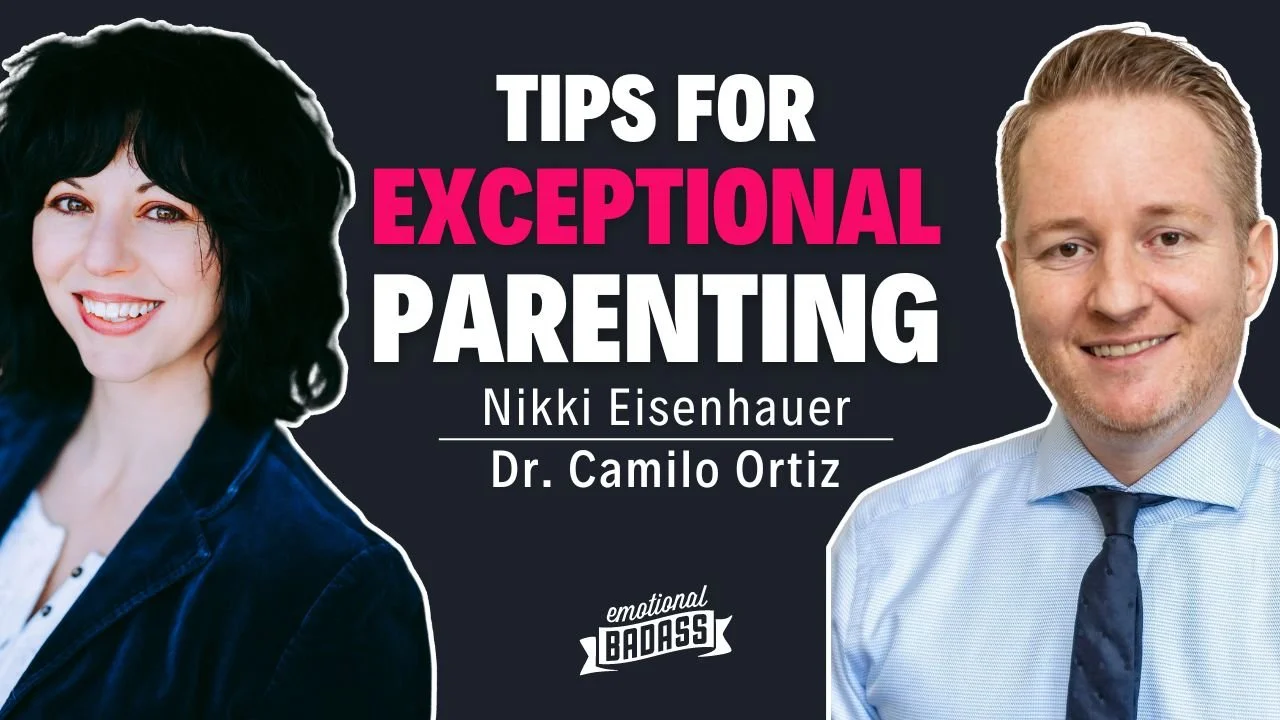Dr. Camilo Ortiz: Tools for Excellent Parenting & Improving Childhood Mental Health & Anxiety
In the intricate world of parenting, understanding the delicate balance between nurturing and fostering independence in our children is crucial. Dr. Camilo Ortiz, a prominent figure in child psychology and mental health, brings to light the profound impact of parenting styles on childhood development. This article delves into the pivotal concepts discussed by Dr. Ortiz, focusing on the thin line between helpful involvement and overparenting, and introduces innovative strategies to combat childhood anxiety.
Increased Parental Involvement Can Impede Child Development
In recent years, a surge in parental involvement has been observed, with parents spending increasingly more time with their children. This heightened presence, although well-intentioned, often results in parents stepping in too quickly to resolve their children's challenges—especially when they face discomfort, distress, disappointment, or danger. Dr. Ortiz raises concerns about this trend, emphasizing that such practices, often categorized under 'helicopter parenting,' may inadvertently hinder children from developing crucial life skills independently. This overprotectiveness deprives children of learning to navigate life's disappointments and risks on their own, a necessary step in maturing into resilient adults.
Innovative Treatment for Child Anxiety
Amidst the escalating rates of childhood anxiety, Dr. Ortiz has pioneered an innovative treatment approach focused on enhancing resilience and self-efficacy through significantly increased child independence. Contrasting with traditional methods that often involve prolonged therapy sessions, his approach aims at empowering children to tackle challenges independently, thereby reinforcing their coping mechanisms and confidence. This methodology not only addresses anxiety more effectively but also fosters a sense of achievement and self-reliance in children
Parenting Fears and the Importance of Independence
A notable barrier to fostering independence in children is the pervasive fear among parents of letting go. Dr. Ortiz employs a unique strategy to ease these fears by reminding parents of their own childhood adventures—experiences untethered by adult supervision that contributed to their personal growth. By encouraging parents to reflect on their formative experiences, he gently nudges them towards granting their children similar opportunities for discovery and learning.
Impact of Modern Parenting Practices
The discussion further explores the ramifications of modern parenting practices, including over-scheduling and excessively shielding children from any form of discomfort or risk. Such practices, as Dr. Ortiz points out, not only overload children but may also contribute to an increase in anxiety, depression, and even susceptibility to addiction later in life. The conversation calls for a reevaluation of these trends, advocating for a balanced approach that allows children to experience and navigate risks under the guiding but not overbearing presence of their parents.
Recommendations for Parents
To combat the challenges posed by helicopter parenting and overparenting, Dr. Ortiz offers practical recommendations for parents seeking to strike the right balance. He advises reducing unnecessary interventions and commands, which can lead to a heightened sense of dependency in children. Encouraging children to engage in independent activities—be it playing unsupervised or taking on small responsibilities—can significantly enhance their problem-solving skills and self-esteem. Moreover, Dr. Ortiz emphasizes the importance of parents modeling resilience by managing their fears and anxieties about granting their children more freedom.
In conclusion, Dr. Camilo Ortiz's insights into parenting and childhood development serve as a valuable guide for parents navigating the complexities of raising emotionally resilient and independent children. By understanding the nuanced impacts of their involvement and fostering an environment that encourages independence, parents can equip their children with the tools necessary to thrive in an ever-changing world.
Episode Tags
- ADD 1
- Abuse 16
- Alcohol 3
- Anger 10
- Archetypes 1
- Bullying 6
- Childhood 37
- Codependency 10
- Covid 4
- Crystal Catalina 4
- Depression 15
- Detachment 2
- Disassociation 4
- Emotions 75
- Existentialism 2
- Faith 1
- Family 28
- Fatigue 4
- Focus 3
- Gratitude 11
- Grief 14
- Guilt 2
- Healers 7
- Healing 52
- High Sensation 4
- Hope 1
- Hypervigilance 7
- Introverts 6
- Lonliness 9
- Love 3
- Manifesting 5
- Manipulation 20
- Masculinity 1
- Men 1
- Mindfulness 38
- Money 10
- Music 3
- Nutrition 2
- Overthinking 8
- PTSD 13
- Parenting 12
- People Pleasing 9
- Perfectionism 6
- Pets 4
- Relationships 20
- Resiliency 14
- Sadness 1
- Self Esteem 19
- Self Love 11
- Self Respect 1
Upcoming Events
Episode Tags
- ADD 1
- Abuse 16
- Alcohol 3
- Anger 10
- Archetypes 1
- Bullying 6
- Childhood 37
- Codependency 10
- Covid 4
- Crystal Catalina 4
- Depression 15
- Detachment 2
- Disassociation 4
- Emotions 75
- Existentialism 2
- Faith 1
- Family 28
- Fatigue 4
- Focus 3
- Gratitude 11
- Grief 14
- Guilt 2
- Healers 7
- Healing 52
- High Sensation 4
- Hope 1
- Hypervigilance 7
- Introverts 6
- Lonliness 9
- Love 3
- Manifesting 5
- Manipulation 20
- Masculinity 1
- Men 1
- Mindfulness 38
- Money 10
- Music 3
- Nutrition 2
- Overthinking 8
- PTSD 13
- Parenting 12
- People Pleasing 9
- Perfectionism 6
- Pets 4
- Relationships 20
- Resiliency 14
- Sadness 1
- Self Esteem 19
- Self Love 11
- Self Respect 1


















